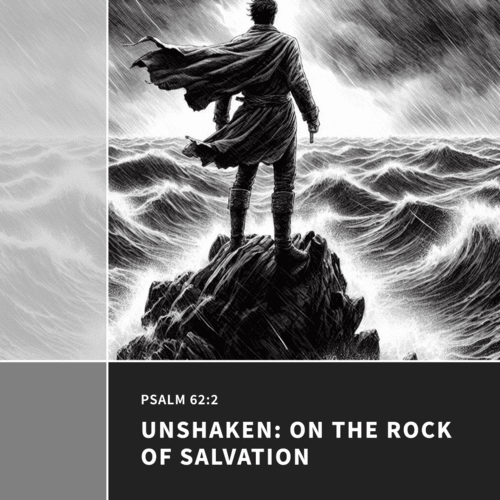The Mystery of Salvation: Why Did God Keep His Plan a Secret?
In the economy of God’s revelation, some truths remain veiled until the time appointed for their disclosure. The plan of salvation—God’s design to redeem fallen humanity through Christ—is perhaps the greatest “mystery” in Scripture.
Join us as we explore how God intentionally veiled aspects of His redemptive plan, revealing it fully only in Christ, and why this progressive revelation served His ultimate purposes in salvation history…
BIBLICAL EVIDENCE FOR SALVATION AS A MYSTERY
In Bible terms, a “mystery” (Greek: musterion) refers not to an unsolvable puzzle, but to a truth previously concealed by God and subsequently revealed in His sovereign timing. Throughout the Old Testament, God progressively unveiled aspects of His redemptive plan through prophecy, typology, and covenant. Yet key elements remained obscured—not because God was forgetful or indecisive—it was purposeful concealment in the perfect wisdom of God. Only in Christ do we see the full revelation of what the prophets—and even the angels—longed to understand.
Analysis of 1 Corinthians 2:8, 14:
The apostle Paul provides critical insight into the mystery of God’s redemptive plan in 1 Corinthians 2. In verse 8, he writes, “None of the rulers of this age understood this, for if they had, they would not have crucified the Lord of glory.” The statement reveals the very actors who orchestrated Christ’s crucifixion did so in ignorance of its true significance. Had they understood God’s purpose—that Christ’s death would become the means of their ultimate defeat—they would have avoided the very action that sealed their doom.
Paul further explains in verse 14 why the mystery remained concealed. Paul establishes a fundamental Reformed principle: spiritual blindness prevents natural human understanding of divine truth apart from sovereign grace. The mystery of salvation remains impenetrable to fallen human reason: it takes divine illumination for us to comprehend.
Examination of 1 Peter 1:10-12
Peter provides complementary testimony regarding this mystery in 1 Peter 1:10-12. This passage yields several profound insights:
- The Old Testament prophets, though divinely inspired, did not fully comprehend the salvation they foretold. They “searched and inquired carefully,” suggesting their own puzzlement over what it is they were prophesying.
- The prophets understood they were serving future generations rather than their contemporaries. Their ministry transcended their immediate context.
- Even angels—heavenly beings with greater spiritual perception than humans—”long to look” into these matters. The Greek term parakupsai suggests bending down to examine something closely, conveying intense curiosity and desire to understand.
Together, these passages establish that God’s redemptive plan remained partially concealed throughout the Old Testament era, with its full disclosure reserved for the advent of Christ and the apostolic proclamation of the gospel.
GOD’S STRATEGIC CONCEALMENT FROM COSMIC ENEMIES
When Paul refers to the “rulers of this age” who failed to understand God’s wisdom, he speaks not merely of human authorities like Pilate and Herod, but primarily of spiritual powers and principalities. These cosmic enemies—Satan and his fallen angels—operated with limited understanding of God’s redemptive intentions.
Satan demonstrated remarkable scriptural knowledge when tempting Jesus (Matthew 4:1-11), yet profoundly misunderstood how Scripture’s redemptive narrative would unfold. Satan’s short-sightedness led him to orchestrate the very event—Christ’s crucifixion—that would accomplish his defeat. As Luther aptly observed, Satan overplayed his hand at Calvary, unwittingly serving as an instrument in his own demise.
The concealment was not incidental but essential to salvation’s accomplishment. Had Satan comprehended God’s redemptive strategy, he would have altered his approach. Divine wisdom necessitated maintaining the mystery until its perfect fulfillment in Christ.
THE PROGRESSIVE REVELATION OF SALVATION
Throughout the Old Testament, God provided glimpses of His redemptive plan through shadows and types that foreshadowed Christ. The sacrificial system established at Sinai pointed toward the ultimate sacrifice. Every slaughtered lamb prefigured “the Lamb of God, who takes away the sin of the world” (John 1:29). The Exodus narrative established a redemption typology that would find its fulfillment in Christ’s greater deliverance. The Davidic kingship laid the foundation for understanding Messiah’s royal identity.
Yet these shadows provided only partial illumination. As the author of Hebrews explains, the law was “a shadow of the good things to come instead of the true form of these realities” (Hebrews 10:1). These types and shadows contained sufficient truth to direct faith toward God’s promises but insufficient clarity to reveal the precise nature of their fulfillment.
CONCLUSION
The mystery of salvation—concealed throughout the Old Testament and revealed in Christ—demonstrates the perfect wisdom of God’s redemptive plan. This strategic concealment served divine purposes: defeating cosmic enemies, establishing redemptive patterns, testing faith, preserving human history, and maximising Christ’s glory.
What the prophets sought to understand and what angels desired to comprehend has now been revealed to believers through apostolic proclamation and the illumination of the Spirit. We possess what previous generations longed to see.
This mystery now revealed demands worship as our response. With Paul, we marvel at God’s wisdom: “To the only wise God be glory forevermore through Jesus Christ! Amen” (Romans 16:27). The progressive unveiling of salvation throughout redemptive history culminates not merely in intellectual understanding but in worship of the God whose wisdom ordained both the mystery and its revelation.
THE MYSTERY OF SALVATION: RELATED FAQs
How does God’s sovereign election relate to the mystery of salvation? God’s sovereign election means He chose His people before the foundation of the world, independent of any foreseen merit or faith. This election remained largely veiled throughout the Old Testament, though hinted at through the calling of Israel and individuals like Abraham. The mystery of who would be saved and how was preserved until the revelation of Christ, demonstrating that salvation depends entirely on God’s sovereign choice rather than human wisdom or initiative.
Why couldn’t people in the Old Testament fully understand God’s plan of salvation? Total depravity renders the natural human mind spiritually blind to divine truth apart from God’s illuminating grace. The Old Testament saints received enough revelation to place saving faith in God’s promises, but their fallen nature prevented complete comprehension of how these promises would be fulfilled in Christ. This principle is confirmed in 1 Corinthians 2:14, where Paul explains that spiritual truths are “folly” to the natural person because they require spiritual discernment that comes only from God.
How does irresistible grace relate to understanding the mystery of salvation? Irresistible grace is God’s effectual work in opening the minds and hearts of His elect to receive spiritual truth. Just as Peter’s confession of Christ came not from human reasoning but divine revelation (Matthew 16:16-17), so all true understanding of salvation’s mystery requires God’s effectual grace. When God illuminates the mind, what was previously obscure becomes clear, and what was foolishness becomes wisdom—not by human effort but divine enablement.
If the plan of salvation was a mystery, how did anyone in the Old Testament get saved? Old Testament believers were saved by faith in God’s promises, just as New Testament believers are saved by faith in their fulfillment through Christ. Though they lacked complete understanding of how redemption would be accomplished, their trust in God’s covenant promises was credited to them as righteousness (Romans 4:3). Abraham, David, and all Old Testament saints were justified by faith alone in the coming Redeemer, even without full comprehension of the cross.
Does the progressive revelation of the mystery of salvation suggest God changes His mind? The progressive revelation of salvation reflects God’s pedagogical wisdom, not any change in His eternal decree. Like a master teacher who reveals complex truths gradually according to His students’ capacity, God unveiled His redemptive plan in stages while His purpose remained unchanging from eternity past. The mystery was always part of God’s single, coherent plan that was “set forth in Christ as a plan for the fullness of time” (Ephesians 1:9-10).
How does the mystery of salvation display the glory of God? The mystery of salvation magnifies God’s glory by demonstrating His incomparable wisdom in designing a plan that even His enemies unwittingly served. By concealing aspects of His redemptive purpose, God ensured that salvation would be recognised as entirely His work rather than human achievement. The gradual unveiling of this mystery across redemptive history creates a tapestry of divine wisdom that, when finally revealed in Christ, leaves both humans and angels in worshipful awe of God’s perfect wisdom.
If salvation was a mystery even to angels, what does that teach us about spiritual knowledge? Angels, though possessing greater spiritual capacity than humans, still depend on God’s revelation to understand His redemptive purposes. This humbling truth teaches us that spiritual knowledge is never a matter of intellectual prowess but always a gift of divine disclosure. Even the most brilliant theological mind remains dependent on God’s Spirit for true understanding, reminding us that salvation knowledge comes not through human wisdom but divine revelation received in faithful humility.
THE MYSTERY OF SALVATION: OUR RELATED POSTS
- Jesus in the Old Testament: Glimpses of the Coming Saviour
- Why Must We Preach Christ and Him Crucified?
Editor's Pick

Paul’s Mandate for Men: Headship Or Servant Leadership? Or Both?
Modern Christianity has fallen into a trap. We've created an either/or battle between "headship" and "servant leadership," as if these [...]

Should We Stop Using Male Pronouns for God? Why Do We Say No?
A friend of ours arrived eagerly at his first theology class in seminary. But he quickly discovered something troubling: the [...]

Did Old Testament Law Force Women to Marry their Rapists?
**Editor’s Note: This post is part of our series, ‘Satan’s Lies: Common Deceptions in the Church Today’… Viral misinformation abounds [...]

From Danvers To Nashville: Two Statements, One Biblical Vision
30 years separate the Danvers Statement on Biblical Manhood and Womanhood (1987) and the Nashville Statement on Human Sexuality (2017). [...]

The Nashville Statement: Why Affirm It Despite Media Backlash?
WHY DO REFORMED CHRISTIANS STAND BY THIS STATEMENT ON MARRIAGE AND GENDER? When the Nashville Statement was released in 2017, [...]

Who Is Belial? Solving The 2 Corinthians 6:15 Mystery
Belial: This name from the pages of Scripture chills the soul. Who is this mysterious figure Paul invokes in 2 [...]

Celibacy Or Castration: What Jesus Really Means in Matthew 19:12
One of Scripture's most shocking misinterpretations led theologian Origen to castrate himself in the third century. His tragic mistake? Taking [...]

Philippians 4:13: Did Paul Really Mean We Can Do ALL Things?
"I can do all things through Christ who strengthens me." It's on gym walls, graduation cards, and motivational posters everywhere. [...]

The Ordinary Means of Grace: Why Are They Indispensable?
ORDINARY MEANS FOR EXTRAORDINARY TRANSFORMATION What if God's most powerful work in believers' lives happens through the most ordinary activities? [...]

Is the Bible God’s Word? Or Does It Only Contain God’s Word?
The authority of Scripture stands at the crossroads of modern Christianity. While some argue the Bible merely contains God’s Word [...]
SUPPORT US:
Feel the Holy Spirit's gentle nudge to partner with us?
Donate Online:
Account Name: TRUTHS TO DIE FOR FOUNDATION
Account Number: 10243565459
Bank IFSC: IDFB0043391
Bank Name: IDFC FIRST BANK






